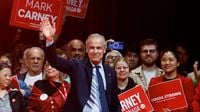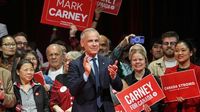In a dramatic turn of events, Canadian Prime Minister Mark Carney's Liberal Party has emerged victorious in the federal election held on April 28, 2025, marking a significant shift in the political landscape. The election results have not only solidified Carney's position as prime minister but also led to the ousting of his main rival, Conservative Party leader Pierre Poilievre, from his long-held seat in Parliament.
The election was largely influenced by U.S. President Donald Trump's controversial comments and trade policies, which sparked outrage among Canadian voters. Trump had repeatedly suggested that Canada should become the 51st state, a notion that resonated poorly with many Canadians. This sentiment played a crucial role in shaping the election's outcome, as voters rallied against perceived threats to their sovereignty.
As the dust settled on the election, projections indicated that the Liberals were leading or had been elected in 168 of the 343 parliamentary seats, just four short of the 172 needed for a majority. Elections Canada paused counting special ballots on the morning of April 29, 2025, delaying the final confirmation of whether the Liberals would need to form a minority government or secure a majority.
In his victory speech, Carney emphasized the importance of unity in the face of external pressures, stating, "As I've been warning for months, America wants our land, our resources, our water, our country. These are not idle threats. President Trump is trying to break us so America can own us. That will never ... ever happen." His remarks highlighted the shifting dynamics of Canadian-American relations and the growing concerns over U.S. intentions.
Carney, who previously held positions as the governor of the Bank of England and the Bank of Canada, campaigned on a platform that promised to defend Canada's sovereignty while also addressing domestic economic challenges exacerbated by the trade war with the U.S. He vowed that every dollar collected from counter-tariffs on U.S. goods would be directed toward supporting Canadian workers affected by the tariffs.
The election was marked by a record turnout, with 7.3 million Canadians casting their votes prior to election day. Voters like Reid Warren from Toronto expressed their discontent with Poilievre's alignment with Trump, stating, "He sounds like mini-Trump to me," reflecting a broader sentiment that ultimately contributed to the Conservative leader's downfall.
Historian Robert Bothwell noted that Poilievre's appeal to the same grievances that resonated with Trump supporters ultimately backfired. He remarked, "The Liberals ought to pay him," referring to the detrimental impact Trump's rhetoric had on the Conservative Party's fortunes.
Despite the Liberal victory, Carney now faces significant challenges ahead. If the final counts reveal that they did not achieve a majority, the Liberals may have to rely on smaller parties, such as the Bloc Québécois, to pass legislation. The Bloc, a separatist party from Quebec, poses its own set of challenges for coalition governance.
The political landscape in Canada has been notably turbulent since the resignation of former Prime Minister Justin Trudeau in January 2025. Trudeau's departure was seen as a pivotal moment that allowed Carney to take the helm of the Liberal Party and reinvigorate its prospects. However, the election results have raised questions about the future direction of the Conservative Party, which has now lost four consecutive federal elections. Analysts suggest that the party may need to undergo a significant reevaluation of its messaging and appeal to regain lost ground.
Carney's plans for his new term include maintaining dental care, offering tax cuts for the middle class, and increasing funding for the Canadian Broadcasting Corporation. His approach aims to address the pressing economic issues facing Canadians, including rising food and housing prices.
The international response to the election has been swift, with leaders from around the world expressing their readiness to work with Carney. Ursula von der Leyen, the European Union's top official, praised the election outcome, emphasizing the importance of defending shared democratic values and promoting multilateralism. Similarly, Australia's Prime Minister Anthony Albanese expressed optimism about continuing to build on the relationship between their nations.
As Carney prepares to navigate the complexities of his renewed mandate, the implications of the election extend beyond Canadian borders. The outcome serves as a reminder of the delicate balance of power and the influence of international relations on domestic politics. With a backdrop of economic uncertainty and geopolitical tensions, the future of Canadian governance remains a critical focal point for both citizens and global observers alike.





